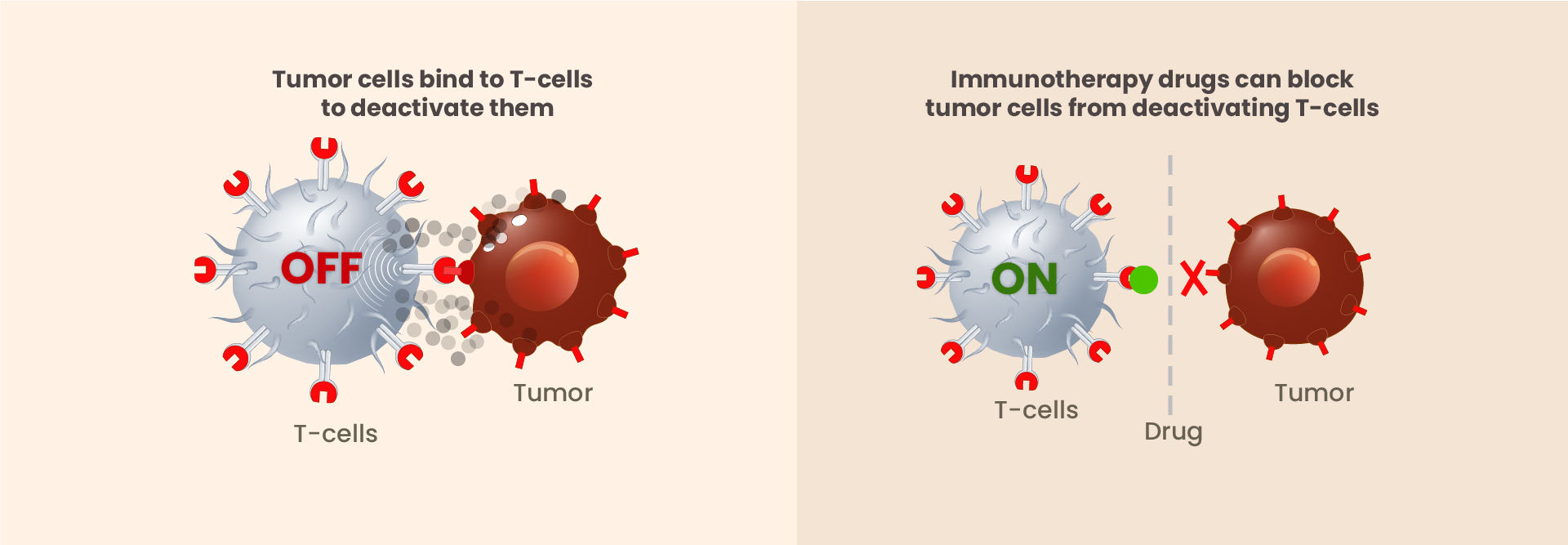Dr Shikhar Kumar is Consultant Medical Oncologist at Onco Cancer Care Centre, Hyderabad.
Immunotherapy has revolutionized the treatment of many types of cancers. The pioneering work of researchers James P.Allison and Tasuki Honjo in the 1990s established that there were ways to activate the immune system to attack cancer, which ultimately resulted in a major breakthrough in developing new cancer treatments. They were awarded the Nobel prize in medicine in 2018 in recognition of this achievement. Immunotherapy was hailed by the scientific community world-wide for fundamentally changing the outcomes for certain groups of patients with cancer.
Let us understand the basics of Immunotherapy.
1) How does Immunotherapy work ?
Immunotherapy works by stimulating, or boosting, the natural defenses of your immune system, so it works harder or smarter to find and attack cancer cells.
Cancer cells are very smart. They have learned to evolve and escape your body’s natural defense mechanism against anything that is foreign (eg. Viruses, bacteria, abnormal cells). Many cancers “inactivate” our body’s T-cells by a complex mechanism that ultimately makes them evade our immune system.
This is where Immunotherapy comes in. It blocks this negative signal and allows our immune system to destroy cancer cells.

T-cell- A important component of your body’s immune system which attacks cancer cells
2) So, does Immunotherapy work for all cancers ?
Unfortunately, the answer is NO. Immunotherapy has shown great promise for certain types of cancers such as
-
Lung cancers
-
Kidney cancer
-
Melanoma (a type of skin cancer)
-
Certain types of blood cancers (eg: Hodgkin’s lymphoma)
Immunotherapy has also shown that it can benefit certain patients with advanced oral cancers, stomach cancers etc.
There is a lot of research ongoing in other types of cancers to see if immunotherapy can help in improving the outcomes. But for now, the standard treatment for most patients is the 3 fundamental pillars of oncology: surgery, chemotherapy and radiation therapy.
3) Are there any side-effects that I should know about ?
Unlike traditional chemotherapy which causes side effects like hair loss, nausea, vomiting, low blood counts, diarrhea etc, immunotherapy drugs have a different side effect profile.
Many patients do not have any side effects at all!
A few patients develop mild side effects like fatigue, skin rashes , thyroid hormonal fluctuations etc and these are easily managed.
However, in a small minority of patients (3-5%), the immune system becomes overly active and can attack the normal organs like the lungs, liver, intestine etc. In such a scenario, we temporarily hold the drug and give the patients steroid medications to suppress the immune system and prevent further damage.
4) How costly is Immunotherapy?
The most commonly used immunotherapy drugs currently in India, Nivolumab and Pembrolizumab, are very expensive. A single vial of pembrolizumab (Keytruda,100mg) costs approximately INR 1.97 Lakh. These medications have to be given intravenously every 3 weeks for a prolonged period to achieve their therapeutic benefits.
However, do not lose hope just yet. There are certain ways by which the financial toxicity of these medications can be reduced. One way is the use of ‘low-dose immunotherapy’, in which these drugs are used at much lower doses than the US FDA approved dosages. The rationale behind this is that there is some evidence from smaller studies that unlike traditional chemotherapy drugs, immunotherapy drugs are effective even when given at these low doses. This strategy will ensure that these potentially life-saving medicines reach out to as many cancer patients as possible. There are ongoing clinical trials in India that are testing low-dose immunotherapy in cancer patients.
5) Who should I take this treatment under ?
It is vital that treatments like chemotherapy and immunotherapy always be taken under the supervision and guidance of a trained medical oncologist only, who will explain the benefits, side effects and precautions in detail to the patient and their family members and will also be available round-the-clock in case any minor/major side effects emerge during treatment. This way, the patients can expect the best chances of getting cured and prolonging their life!

